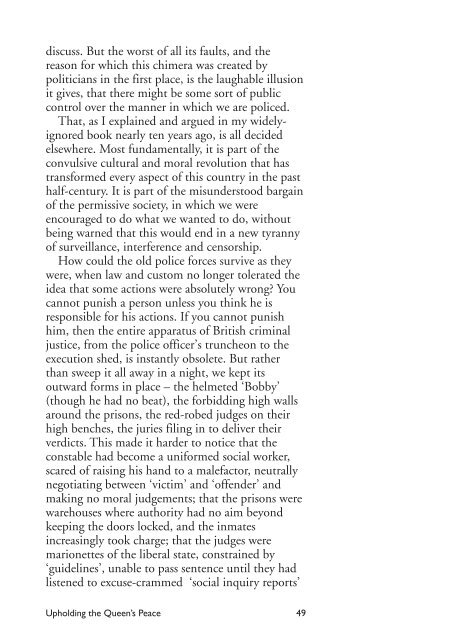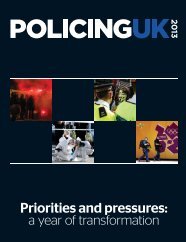Policing, crime and personal responsibility, Peter Hitchens
Policing, crime and personal responsibility, Peter Hitchens
Policing, crime and personal responsibility, Peter Hitchens
Create successful ePaper yourself
Turn your PDF publications into a flip-book with our unique Google optimized e-Paper software.
discuss. But the worst of all its faults, <strong>and</strong> the<br />
reason for which this chimera was created by<br />
politicians in the first place, is the laughable illusion<br />
it gives, that there might be some sort of public<br />
control over the manner in which we are policed.<br />
That, as I explained <strong>and</strong> argued in my widelyignored<br />
book nearly ten years ago, is all decided<br />
elsewhere. Most fundamentally, it is part of the<br />
convulsive cultural <strong>and</strong> moral revolution that has<br />
transformed every aspect of this country in the past<br />
half-century. It is part of the misunderstood bargain<br />
of the permissive society, in which we were<br />
encouraged to do what we wanted to do, without<br />
being warned that this would end in a new tyranny<br />
of surveillance, interference <strong>and</strong> censorship.<br />
How could the old police forces survive as they<br />
were, when law <strong>and</strong> custom no longer tolerated the<br />
idea that some actions were absolutely wrong? You<br />
cannot punish a person unless you think he is<br />
responsible for his actions. If you cannot punish<br />
him, then the entire apparatus of British criminal<br />
justice, from the police officer’s truncheon to the<br />
execution shed, is instantly obsolete. But rather<br />
than sweep it all away in a night, we kept its<br />
outward forms in place – the helmeted ‘Bobby’<br />
(though he had no beat), the forbidding high walls<br />
around the prisons, the red-robed judges on their<br />
high benches, the juries filing in to deliver their<br />
verdicts. This made it harder to notice that the<br />
constable had become a uniformed social worker,<br />
scared of raising his h<strong>and</strong> to a malefactor, neutrally<br />
negotiating between ‘victim’ <strong>and</strong> ‘offender’ <strong>and</strong><br />
making no moral judgements; that the prisons were<br />
warehouses where authority had no aim beyond<br />
keeping the doors locked, <strong>and</strong> the inmates<br />
increasingly took charge; that the judges were<br />
marionettes of the liberal state, constrained by<br />
‘guidelines’, unable to pass sentence until they had<br />
listened to excuse-crammed ‘social inquiry reports’<br />
Upholding the Queen’s Peace 49
















